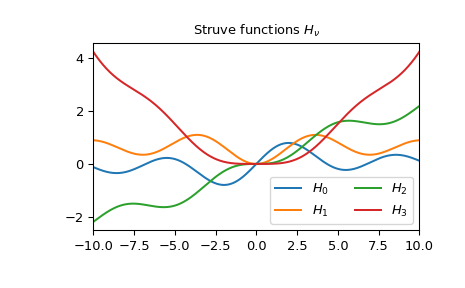scipy.special.struve — SciPy v1.15.3 Manual (original) (raw)
scipy.special.struve(v, x, out=None) = <ufunc 'struve'>#
Struve function.
Return the value of the Struve function of order v at x. The Struve function is defined as,
\[H_v(x) = (z/2)^{v + 1} \sum_{n=0}^\infty \frac{(-1)^n (z/2)^{2n}}{\Gamma(n + \frac{3}{2}) \Gamma(n + v + \frac{3}{2})},\]
where \(\Gamma\) is the gamma function.
Parameters:
varray_like
Order of the Struve function (float).
xarray_like
Argument of the Struve function (float; must be positive unless v is an integer).
outndarray, optional
Optional output array for the function results
Returns:
Hscalar or ndarray
Value of the Struve function of order v at x.
Notes
Three methods discussed in [1] are used to evaluate the Struve function:
- power series
- expansion in Bessel functions (if \(|z| < |v| + 20\))
- asymptotic large-z expansion (if \(z \geq 0.7v + 12\))
Rounding errors are estimated based on the largest terms in the sums, and the result associated with the smallest error is returned.
References
Examples
Calculate the Struve function of order 1 at 2.
import numpy as np from scipy.special import struve import matplotlib.pyplot as plt struve(1, 2.) 0.6467637282835622
Calculate the Struve function at 2 for orders 1, 2 and 3 by providing a list for the order parameter v.
struve([1, 2, 3], 2.) array([0.64676373, 0.28031806, 0.08363767])
Calculate the Struve function of order 1 for several points by providing an array for x.
points = np.array([2., 5., 8.]) struve(1, points) array([0.64676373, 0.80781195, 0.48811605])
Compute the Struve function for several orders at several points by providing arrays for v and z. The arrays have to be broadcastable to the correct shapes.
orders = np.array([[1], [2], [3]]) points.shape, orders.shape ((3,), (3, 1))
struve(orders, points) array([[0.64676373, 0.80781195, 0.48811605], [0.28031806, 1.56937455, 1.51769363], [0.08363767, 1.50872065, 2.98697513]])
Plot the Struve functions of order 0 to 3 from -10 to 10.
fig, ax = plt.subplots() x = np.linspace(-10., 10., 1000) for i in range(4): ... ax.plot(x, struve(i, x), label=f'$H_{i!r}$') ax.legend(ncol=2) ax.set_xlim(-10, 10) ax.set_title(r"Struve functions HνH_{\nu}Hν") plt.show()
